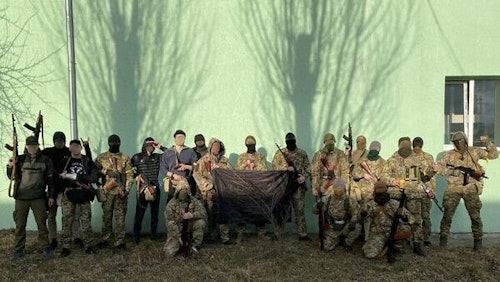Zelenskyy has urged Europe to support Ukraine's membership candidacy to the bloc at the upcoming summit at the end of June and called for more action to stop the Russian aggression.
Ukraine’s President Volodymyr Zelenskyy urged the EU heads to give Ukraine candidate status for the bloc's membership at the upcoming summit in late June.
 ADVERTISEMENT
ADVERTISEMENT
 ADVERTISEMENT
ADVERTISEMENT
Speaking to the Copenhagen Democracy Summit in a video address, Zelenskyy asked the leaders of the 27 member states to show “that its words about the Ukrainian people being part of the European family aren’t a hollow sound.”
Review the day's most important developments in the Ukraine war below.

 ${title}
${title}
Live ended
Friday's key points:
Mariupol’s mayor has warned that cholera and other deadly diseases could kill thousands of people in the Russian-occupied city as corpses lie uncollected.
President Zelenskyy has pleaded for Ukraine's entry into the European Union, and called for EU leaders not to leave his country in a "grey zone".
Ukraine is losing up to 200 troops a day, according to a Zelenskyy aide. This is more than double the previous estimates.
Two Britons and a Moroccan national captured fighting Russian forces in Ukraine were sentenced to death Thursday. Their sentencing has been denounced in Ukraine and the West. They will face a firing squad, the Russian state news agency RIA Novosti reports.
Fierce street fighting is continuing in Sievierodonetsk, with the eastern Ukrainian city being hammered by Russian bombs. Some 10,000 civilians are trapped in the city and cannot be evacuated, says its mayor.
No agreement on exporting much-needed Ukrainian grain has been reached. Both Ukraine and Russia blame one another for the impasse.
Putin has compared himself to Tsar Peter the Great, paralleling their quests to capture land for Russia.
Finland is set to begin fencing off its 1800-kilometre border with Russia, fearing so-called "hybrid" reprisals over its NATO bid.
NATO's deputy chief has said he is "confident" that Sweden and Finland will be able to join the defensive alliance, despite Turkish concerns.
- Nearly 5 million Ukrainians have registered as refugees since the Russian invasion, leading the UNHCR to call the Ukraine war "one of the largest human displacement crises in the world."
That's it for our live blog on Friday night. We will be back with the Ukraine war latest on Saturday morning.
Former McDonald's restaurants in Russia to relaunch under new branding, ownership
Restaurants previously under the McDonald's brand will reopen under new branding and ownership on Sunday, more than three decades after the arrival of the hugely popular Western fast-food chain.
McDonald's iconic "Golden Arches" have been taken down at sites in Moscow and St. Petersburg, where they will make way for a new logo comprising two fries and a hamburger patty against a green background.
The reopening will initially cover 15 locations in Moscow and the surrounding region.
The new chain's name remains a closely guarded secret.
The relaunch will begin on Russia Day, a patriotic holiday celebrating the country's independence, at the same flagship location in Moscow's Pushkin Square where McDonald's first opened in Russia in January 1990.
McDonald's last month said it was selling its restaurants in Russia to one of its local licensees, Alexander Govor.
The deal marked one of the most high-profile business departures since Russia invaded Ukraine on 24 February.
Russia central bank official says impact of sanctions impossible to assess
The head of Russia’s central bank says it is impossible to draw conclusions on the impact of Western sanctions at this stage.
“So far, the effects of the sanctions are less acute than we feared. This also shows the ability of companies to adapt,” Elvira Nabiullina, chair of the Central Bank of Russia, said at a briefing on Friday.,
"But it is premature to say that the full effect of the sanctions has manifested itself," she said, also announcing the lowering of interest rates to their prewar levels.
“The situation is uncertain, the situation is developing and the situation of the structural restructuring of our economy, of its capacity to rebuild, is also a process, so it’s premature to draw any conclusions here,” Nabiullina said.
She added that the Kremlin was preparing a possible legal challenge against EU sanctions on Russia’s central securities depository and measures freezing the settlement of rouble transactions by its EU-based counterparts.
She did not provide details, but admitted such a challenge “would not be easy”.
Civilians keep escaping eastern Ukraine as battles for control of Donbas continue
Hundreds of people continue to flee intense fighting in eastern Ukraine as Russian and Ukrainian forces battle for control of key cities and villages in the Luhansk and Donetsk regions.
Dozens of Ukrainians left the city of Pokrovsk on Friday on a special evacuation train heading for Dnipro and other cities further west.
The train carried about 300 people — mostly women, children, and the elderly — who were forced to leave as the fighting neared their homes.
Svitlana Kaplun said her entire family decided to leave when the shelling reached their neighbourhood in the city of Krasnohorivka, about 20 kilometres from the city of Donetsk under the control of pro-Russian separatist forces.
“We live on the frontline now. The kids are worried all the time, they are afraid to sleep at night, so we decided to take them out,” she said.
Most of the evacuees are from areas where Russian forces are concentrating their offensive to capture the whole Donbas and the cities of Sievierodonetsk, Sloviansk, Bakhmut, and Popasna.
Russia quits WTO after April suspension from UN organisation
Russia made official its withdrawal from the World Tourism Organization on Friday. The country was suspended in April following global outrage over its military offensive against Ukraine.
The government "accepts the proposal of the Russian Ministry of Foreign Affairs (...) concerning the withdrawal of the Russian Federation from the World Tourism Organization," said a decree signed by Prime Minister Mikhail Mishutin.
The WTO, a United Nations agency responsible for promoting tourism and based in Madrid since 1976, announced the suspension of Russia on 27 April because of its invasion of Ukraine, which it considered contrary to its values.
Because of the war in Ukraine, Russia has become increasingly isolated on the diplomatic scene. It has been excluded from the United Nations Human Rights Council, where its seat has been suspended.
Western countries have also imposed heavy economic sanctions on Moscow.
Kuleba and Truss strongly condemn foreign fighters' 'sham trial' in Donetsk
The Ukrainian foreign minister says he and Britain's defence secretary have discussed the plight of the three foreign fighters sentenced to death by pro-Russian separatists.
Dmytro Kuleba wrote on Twitter that he and Liz Truss “strongly condemned the sham trial against prisoners of war in Russian-occupied Donetsk” during a telephone conversation Friday.
Kuleba says "As combatants, they are protected by international humanitarian law and must be treated accordingly. We keep working together to ensure their release.”
His remarks referenced separatist claims that the two British and one Moroccan man were mercenaries rather than combatants protected by international conventions.
Ukrainian officials, as well as the fighters’ families, have repeatedly stressed that all three were regular members of the Ukrainian army.
Kuleba said Truss and he discussed ways to ratchet up pressure on Moscow and hinted that the UK is planning to impose a fresh round of sanctions on Russia.
“I look forward to the next round of UK sanctions. We both agreed that no one in the world has a right to get weary of this war until Ukraine prevails,” he said.
German chancellor asks Serbia to join sanctions against Russia, Serbian president says
German Chancellor Olaf Scholz has strongly urged Serbia to join sanctions against Russia over its invasion of Ukraine, Serbian President Aleksandar Vučić said on Friday.
Vučić also emphasized the economic ties, especially in the energy field, and the very close traditional relations with Russia.
"We expect these sanctions to be supported by all the candidate countries for accession to the European Union," said Scholz.
"It is important to work for more and more countries to join the sanctions, because they are the instrument, together with arms deliveries, that will help Ukraine to determine its future," he said.
Serbia remains one of a handful of European countries that has not imposed sanctions on Russia.
Russian forces accused of intentionally targetting energy facilities in Mykolayiv
The CEO of a Ukrainian regional power company has accused Russian troops of deliberately destroying energy infrastructure in the southern Mykolayiv region.
“Electricity for the population, industry and agriculture is a basic good, without which normal life is impossible. Therefore, energy facilities become a target for enemy troops,” Vadym Danylkiv, CEO of regional monopoly Nikolaevoblenergo, said in a statement Friday.
Since the start of June, Russian shelling has destroyed 14 overhead power lines and 377 transformer substations, and damaged a key 40 MVA transformer, the company said. Danylkiv said the Mykolayiv region has “an acute need for transformer oil.”
“Just as a result of the latest damage, as a result of the shelling of a powerful transformer, we lost 26 tonnes of oil. Its purchase means (spending) about UAH 2.6 million for such a volume, plus complex logistics,” Danylkiv was cited as saying.
Russian bombardment near Kharkiv injures at least two, search for casualties ongoing
At least two civilians have been hospitalised following Russian shelling on the outskirts of Ukraine’s second-largest city, according to regional emergency services.
Emergency teams on Friday were searching for more casualties in Derhachi, a town 12 kilometres northwest of Kharkiv, which has been targeted in a series of strikes in recent weeks.
Following the shelling, fires broke out in residential buildings, the Main Directorate of the State Emergency Service in the Kharkiv region said in a statement.
Kharkiv’s mayor said the city, which was a key military objective in the early stages of Russia’s invasion, continues to suffer regular strikes in a bid by Moscow to prevent the city from returning to normal.
“The intensity of shelling … has become a little less, but bombs and rockets of higher power are being used in the city of Kharkiv. The destruction that we see today is very, very serious,” Ihor Terekhov said in a televised briefing.
The leaders of nine countries ask NATO to reinforce its eastern flank
The leaders of nine Central and Eastern European countries have met in Bucharest to demand a strengthening of NATO's eastern flank in the face of Russian aggression in Ukraine.
The meeting comes less than three weeks from a summit of the Alliance scheduled for the end of June in Madrid.
"Faced with increased security risks in Romania and the Black Sea, consolidating NATO on its eastern flank (...) becomes all the more urgent and crucial," Romanian President Klaus Iohannis said as he opened the meeting. co-chaired by her Polish counterpart Andrzej Duda.
The summit will draw "a long-term vision, through its new strategic concept, by putting collective defence and Article 5 at the heart of the actions", he said, referring to NATO’s article that states that an attack on one member is an attack on all of them.
The heads of state of the nine countries represented -- Bulgaria, Estonia, Hungary, Latvia, Lithuania, Poland, the Czech Republic, Romania and Slovakia -- will also discuss the impact on "vulnerable partners", including Moldova and Georgia.
(AFP)
Germany pledges medical aid to Ukraine
Germany will help Ukraine provide medical help for war victims by helping build trauma centres for the wounded, donating prosthetic limbs and deploying German doctors to the country.
During a visit to the western Ukrainian city of Lviv, Health Minister Karl Lauterbach said "Ukraine needs humanitarian aid just as urgently as it needs our military support."
The aid would include Germany helping to supply prostheses, deploying 200 doctors in Ukraine, setting up training on treating burns and connecting some hospitals in Ukraine to a telemedicine service, the ministry said in a statement.
Germany's largest artificial limb maker, Ottobock, is already in talks with the health ministry to help produce and fit prostheses in mobile container workshops and train orthopaedic specialists directly in Ukraine, a company spokesperson said.
"Ottobock has partners in Ukraine and continues to supply products there, and the container workshops could make supplies possible wherever the network was destroyed by war," he said.
(Reuters)
Cholera and other diseases could kill thousands in Mariupol, mayor says
Mariupol's mayor, Vadym Boichenko has warned that Cholera and other deadly diseases could kill thousands of people in the southern Ukrainian city as corpses lie uncollected amid warmer weather.
Boichenko said wells had been contaminated by the corpses of people killed during weeks of Russian bombardment and siege, and that the collection of bodies by the city's Russian occupiers was proceeding slowly.
"There is an outbreak of dysentery and cholera. This is, unfortunately, the assessment of our doctors: that the war which took over 20,000 residents ... unfortunately, with these infection outbreaks, will claim thousands more Mariupolites," he told national television.
Boichenko, who is based outside Mariupol, said the city had been placed into quarantine.
Ukraine says about 100,000 people are now in Mariupol, a once vibrant city that had a population of about 430,000 before the war but is now an urban wasteland.
(Reuters)
Russia's brain drain: war with Ukraine prompts tens of thousands to flee abroad
Russia's best and brightest have left in their thousands following the country's invasion of Ukraine.
Euronews' Monica Pinna investigates the reasons behind this brain drain.
Read more below:
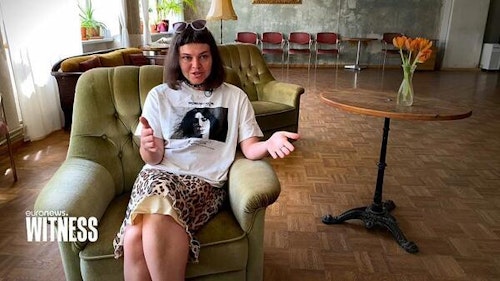
France ready to take part in 'operation' to unblock the port of Odesa
France says it is ready to participate in an "operation" to lift the blockade of the port of Odesa in southern Ukraine and to export Ukrainian cereals to countries in need.
“We are at the disposal of the parties so that an operation is put in place which would allow access to the port of Odesa in complete safety, that is to say, to be able to allow boats to pass despite the fact that the sea is mined," a presidential adviser said.
The Elysée made the announcement in response to questions raised by French President Emmanuel Macron's call to "not humiliate Russia".
"We want victory for Ukraine. We want the territorial integrity of Ukraine to be restored. We want this conflict, this war of Russia against Ukraine to cease as soon as possible," the adviser continued.
The date of a visit by Macron to Ukraine has yet to be fixed but will take place when it will be "useful to President Zelenskyy" the French presidency said.
Macron will travel to Romania on Tuesday to meet the French troops stationed there, then to Moldova on Wednesday to affirm his support for this country affected by the war in Ukraine.
(AFP)
UK defence minister makes unannounced visit to Kyiv
British Defence Secretary Ben Wallace has met Ukrainian President Volodymyr Zelenskyy during a previously unannounced visit to Kyiv.
The two-day working visit aimed to hear first-hand "how the operational needs of the Ukrainian Armed Forces are evolving as the nature of the conflict continues to change," the UK Ministry of Defence said in a statement.
"This will ensure that continued UK support evolves with these needs and is adapted to the situation on the ground," the ministry added.
Ukrainian President Volodymyr Zelenskyy thanked the UK for its leading role in Western support for Ukraine:
"Words turn into actions. This is what makes the difference between relations between Ukraine and Great Britain and those between Ukraine and other countries," the Ukrainian president said.
“Weapons, finances, sanctions: in these three files, Britain shows its leadership,” continued Zelenskyy in a video posted on his Telegram account.
Wallace hailed the "extraordinary" effort made by the President and the Ukrainian people to resist the Russian invasion.
Wallace also held talks with his Ukrainian counterpart, Oleksii Reznikov. Along with Zelenskyy, they discussed "the equipment and training that the United Kingdom is currently providing, and what additional support could be offered to help Ukrainian forces defend their country", according to the Ministry.
Britain has been one of the biggest donors of military equipment to Ukraine and recently agreed to send rocket launch systems that can target Russian artillery positions in eastern Ukraine.
Western officials say the conflict is becoming a grinding slow-motion war as Russian forces inch forward in their offensive to capture Ukraine's eastern industrial heartland.
(AP, AFP)
No signs of Russian threat to Nordic countries, says NATO deputy
NATO's deputy chief has said he sees no immediate military threat to Sweden and Finland from Russia at a Copenhagen Democracy Summit on Friday.
Deputy Secretary-General Mircea Geoana also said he was confident that the NATO hopefuls would be admitted into the defensive alliance, despite Turkish objections.
Finland and Sweden applied to join NATO last month in May, over Russia's invasion of Ukraine. However, their bids have faced opposition from Turkey, which accuses the pair of supporting and harbouring Kurdish militants and other groups it deems terrorists.
Both strongly deny these allegations.
Asked about the security guarantees provided to Sweden and Finland during their NATO accession process, Geoana said he did not see any real risk from Russia.
"We don't see signs from Russia of having the capabilities or intention at this point to be aggressive in military terms against these two aspirant countries," he said.
"We can treat this period with caution in a proactive way, but we don't see real risks from a traditional military standpoint for Finland and Sweden."
When asked by reporters if their NATO bids would be successful, the deputy general said he was confident they would be admitted into the 30-member alliance.
"We are confident that Sweden and Finland will join our ranks," Geoana said. "Allies have concerns. And Turkey has some concerns that are legitimate when it comes to terrorists," he added.
Sweden and Finland have said they condemn terrorism and are open to dialogue.
(Reuters)
Finland mulls fencing border, fearing 'hybrid' Russian attacks
Finland plans to erect fencing along its border with Russia, worrying about so-called hybrid" reprisals from Russia, the government said Friday.
Concerned that Moscow will use migrants to exert political pressure, Helsinki submitted a draft amendment Thursday, which aims to strength fencing at certain points of the country's huge 1,300 kilometre (810 miles) long border with Russia. This is desired "as soon as possible."
The announcement follows Finland's candidacy for NATO, which Russia has said may force it to take "retaliatory steps."
The Nordic country fears in particular so-called "hybrid" reprisals, such as cyberattacks or non-military destabilisation operations.
"The purpose of this bill is to improve the operational capacity of border guards in response to hybrid threats," Anne Ihannus, adviser to the Ministry of the Interior, told AFP.
"The war in Ukraine has contributed to the urgency of this issue," the official stressed.
Currently, Finland's borders are secured by small wooden palisades, intended to prevent cattle from crossing.
“What we are looking to build now are sturdy fences that have the effect of real barriers,” explained Sanna Palo, director of legal affairs at the border guards.
"In all likelihood, the fence will not cover the entire eastern border, but will target the places considered most important," she said.
In the event of an influx of migrants, the government's proposal also aims to concentrate asylum seekers at specific points on the border.
The places considered as priorities will be defined later, as well as the budget for the project, said the Ministry of the Interior.
Most of the border runs through very sparsely populated areas.
(AFP)
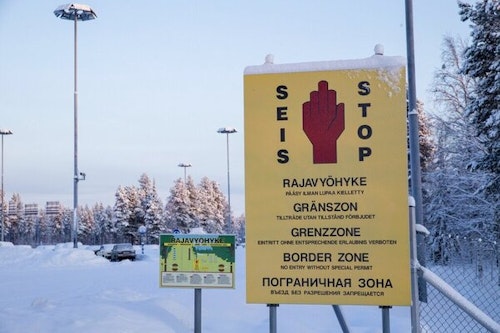
UK FM and Ukraine discuss release of POWs
The UK's foreign minister, Liz Truss, has spoken with her Ukrainian counterpart, Dmytro Kuleba, to discuss efforts to secure the release of prisoners of war “held by Russian proxies”.
This comes after two British nationals, and a Moroccan, were handed a death sentence by a pro-Russia court in the self proclaimed Donetsk People's Republic (DPR).
The three men had been fighting alongside Ukrainian forces before they were captured by Russia a few weeks ago. They were later sent to the breakaway region in eastern Ukraine were they stood trial Thursday.
Truss described the death sentence against Aiden Aslin and Shaun Pinner as “an egregious breach of the Geneva convention”.
Earlier on Friday, Russia’s foreign ministry spokesperson, Maria Zakharova, described the UK's reaction to the sentencing in Russian-separatist controlled Donetsk as “hysterical”.
Writing on Telegram, she said the UK should appeal to the breakaway DPR – which is internationally recognised as part of Ukraine – over the cases.
Russia’s foreign minister Sergei Lavrov declined to comment on the cases, saying they are under the jurisdiction of the DPR.
(Reuters)
Meet the anarchists and anti-fascists fighting Russia in Ukraine
A self-styled anti-authoritarian platoon in Ukraine says it is "fighting for Ukrainian society", not the government in Kyiv.
Read more below.
Zelenskyy calls for more support from Europe
A plea now from Ukraine's President Volodymyr Zelenskyy for Ukraine's EU candidacy.
The Ukrainian leader urged EU leaders not to leave his country in a "grey zone" and to decide by the end of June if they will grant Ukraine official EU candidate status.
Speaking via video-link from Kyiv at the Copenhagen's Democracy Summit Friday, Zelenskyy said:
"The first thing is to finally remove this 'grey zone', so tempting for the Russian state (...) In the coming weeks, the European Union could take a historic step which will prove that words about the membership of the Ukrainian people to the European family are not in vain."
Zelenskyy also called for more actions from Europe to support Ukraine and stop Russian aggression.
He said European countries must not hesitate to cut off any relations with Russia.
"Why, if Russia cynically literally violates all essential documents of international law, are there still some who hesitate to block any relationship with such a state? (...) The European system will lose if the words are not accompanied by actions," he warned.
The European Commission is due to deliver its opinion on the matter in the coming days, before EU leaders decide whether to grant Ukraine official candidate status at a summit on June 23-24.
"Why, if polls show that 71 per cent of Europeans consider Ukraine to be part of the European family, are there still political sceptics who are reluctant to allow us to join the European Union?" he asked.
The 27 member states are divided on the question of Ukraine's candidacy for the EU.
While many countries, mainly in Eastern Europe, support Ukraine's membership, some like the Netherlands or Denmark are sceptical, fearing that Ukraine is not ready.
Discussions are underway to develop a common position.
If Ukraine achieves "candidate status", it will start a process of negotiations and potential reforms that could take years, if not decades, before it is on the verge of joining the EU.
Several EU states have dampened Kyiv's hopes of an "accelerated" process.
(AFP AP)
UN voices concern over death sentences
The UN human rights office (OHCHR) says it's concerned about the death sentences imposed by pro-Moscow rebels in Ukraine on three captured foreigners who were fighting on the Ukrainian side.
A court in the self-proclaimed Donetsk People’s Republic found two Britons and one Moroccan guilty of seeking the violent overthrow of power. The men were also convicted of mercenary activities and terrorism.
U.N. rights office spokeswoman Ravina Shamdasani noted Friday that, according to the Ukrainian military, all three were part of Ukraine’s armed forces. She said if that is the case they “should not be considered as mercenaries”
Shamdasani said that, since 2015, the office has observed that the judiciary in rebel-run separatist areas “has not complied with essential fair trial guarantees, such as public hearing, independence and impartiality of the court and the right not to be compelled to testify.”
She added that “such trials against prisoners of war amount to a war crime.”
(AFP AP)
Sievierodonetsk: 'Battles are going on for every house', says governor
A regional governor says Ukrainian soldiers are fighting for every house in street battles in the battle for Sievierodonetsk, a key city in eastern Ukraine.
Luhansk governor Serhiy Haidai told The Associated Press (AP) Friday that Ukrainian forces have retained control of the industrial area on the edge of the city of Sievierodonetsk and also control some other sections.
He said that “battles are going on for every house and every street.”
Sievierodonetsk, the administrative centre of Luhansk province in the Donbas industrial region, has been the focus of the Russian offensive in recent weeks.
10,000 civilians are thought to be trapped inside the city.
(AP)
UK MP: Condemned Britons have 'significant rights' as prisoners of war
A British MP has condemned the sentencing of two Britons to death by Russian-backed forces, saying they should be afforded rights as prisoners of war.
Aiden Aslin and Shaun Pinner, who were captured fighting Russian forces in Ukraine, were handed death penalties Thursday by a court in the self-proclaimed Donestk People's Republic. A Moroccan student Saaudun Brahim was also sentenced.
"This is a really concerning situation," said Labour MP for Nottingham North, Alex Norris."These are legitimate combatants, are prisoners of war, and as such have significant rights. They should not have been tried by that tribunal that they have been, in the way that they have been.
"As a result, those rights aren’t being upheld," he added.
The British lawmaker called on his country to make a unified response.
"I think it’s really important that we send a strong message back from this country of our unity on this," he said.
"That these gentlemen must have their rights, and they must be treated properly as they should be under the Geneva convention."
Norris urged diplomatic efforts to start in earnest.
"Whether that’s calling in the ambassador, or whatever other channels are open, we must use all of them, and show a united front that we expect their rights to be upheld," he said.
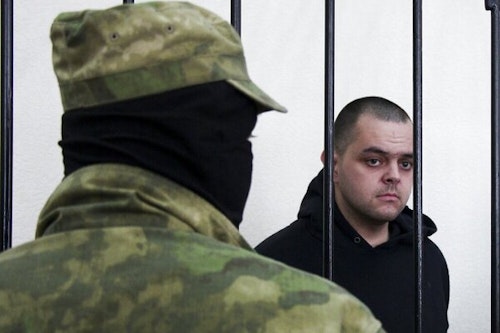
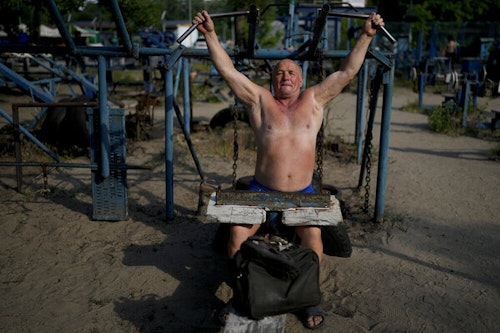
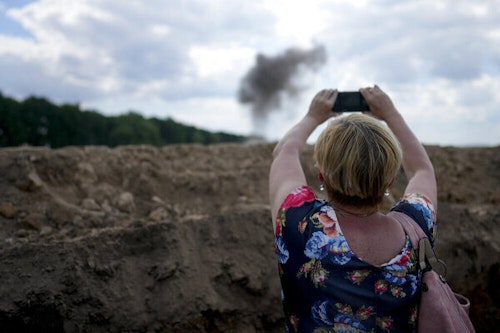
Death sentence for captured foreign fighters denounced by West
The West and Ukraine have denounced a pro-Moscow court's decision to sentence three foreigners fighting for Ukraine to death, calling the proceedings a sham and violation of the rules of war.
Aiden Aslin (UK), Shaun Pinner (UK) and Saaudun Brahim (Morrocco) were handed the death penalty Thursday evening by a court in the self-proclaimed Donetsk People's Republic, having been captured by Russian forces weeks ago.
The three men were found guilty of seeking the violent overthrow of power, an offence punishable by death in the unrecognized eastern republic. The men were also convicted of mercenary activities and terrorism.
Saadoun's father, Taher Saadoun, told the Moroccan online Arab-language newspaper Madar 21 that his son is not a mercenary and that he holds Ukrainian citizenship.
Saadoun had been studying at National Institute of Dialectics for Space Sciences before it was destroyed in the war and he was drafted into the Ukrainian army as a translator, according to his father.
Aslin’s and Pinner’s families have said that the two men were long-serving members of the Ukrainian military. Both are said to have lived in Ukraine since 2018.
Russian state news agency RIA Novosti reported that the trio will face a firing squad. They have a month to appeal.
(AP)
Fighting continues in Sievierodonetsk
Ukrainian and Russian forces are still battling it out in the eastern city of Sievierodonetsk, with Kyiv claiming it has frustrated Moscow's attacks.
“The occupiers, with the help of motorized rifle units and artillery, conducted assault operations in the city of Sievierodonetsk," said the General Staff of the Armed Forces of Ukraine in an operational update Thursday evening.
"They were not successful; the fighting continues,” it added.
Ukrainian forces had also repelled a Russian attack on the village of Toshkivka, northwest of Sievierodonetsk, according to the General Staff.
The Ukrainian governor of the eastern Luhansk region, where Sievierodonetsk is located, said Thursday that “fierce battles” continue to engulf the city.
Serhii Haidai said Russian forces continue to shell the neighbouring city of Lysychansk using large-calibre weapons which “pierce even concrete,” in a Telegram post.
“It is extremely dangerous for civilians to remain, even in shelters,” he said.
(AP)
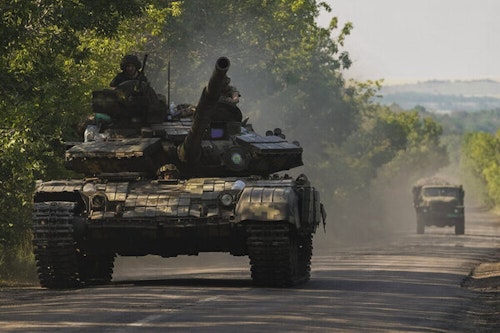
Putin compares himself to Peter the Great
Russian president Vladimir Putin compared his current actions in Ukraine to Tsar Peter the Great Thursday, who conquered swathes of eastern and central Europe in the early 18th century.
After marking the Tsar's 350th birthday with a visit to a museum, Putin told a group of young entrepreneurs “you get the impression that by fighting Sweden he was grabbing something. He wasn’t taking anything, he was taking it back."
In comments that were later televised, Putin compared his offensive in Ukraine with Peter's campaign to expand the then Russian Empire.
"Apparently, it also fell to us to return [what is Russia’s] and strengthen [the country]," said the Russian leader. "if we proceed from the fact that these basic values form the basis of our existence, we will certainly succeed in solving the tasks that we face."
Putin also noted how when Peter the Great founded Saint Petersburg, the former Russian capital, “none of the countries in Europe recognised this territory as belonging to Russia.”
"Peter the Great waged the Great Northern War for 21 years," he said. "It would seem that he was at war with Sweden, he took something from them. He did not take anything from them, he returned [what was Russia’s].
Putin continued: "Everyone considered it to be part of Sweden. But from time immemorial, Slavs had lived there alongside Finno-Ugric peoples. It is our responsibility also to take back and strengthen. Yes, there have been times in our country’s history when we have been forced to retreat, but only to regain our strength and move forward.”
By defeating Sweden in the Great Northern War (1700-1721) Peter the Great made Russia a leading regional power and an important player in European affairs.He was also a modernising, Europe-looking leader who drew inspiration from the west to develop Russia's army, state, church and society. Peter the Great's shift Europewards still has an important cultural legacy today.
However, amid heighten animosity between the west and Russia over the Ukraine invasion, Moscow is downplaying Peter’s affinity for Europe and focusing on how he expanded Russian borders.
Peter I reigned first as tsar and then as emperor from 1682 until his death in 1725.
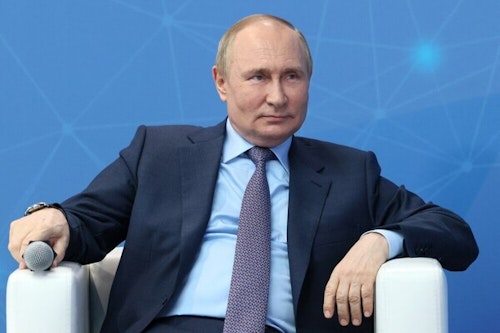
Russia may earn more from fossil fuels than before invasion - US official
Russia may currently be getting more revenue from its fossil fuel sales than before its invasion of Ukraine, claimed one United States (US) official.
Increases in global oil and gas prices have offset the impact of important bans, US energy security envoy, Amos Hochstein, said during a senate hearing.
Russia has been able to sell more to other buyers, including major energy consumers China and India, by offering it at a discount to oil from other origins, he said.
Russia is the third-largest oil producer after the US and Saudi Arabia.
It is the world's largest exporter of oil and petroleum products, data from the International Energy Agency (IEA) shows.
(Reuters)
Ukraine losing up to 200 troops a day - Zelenskyy aide
Between 100 and 200 Ukrainian troops are being killed on the front line every day, according to a senior Ukrainian presidential aide.
Speaking to the BBC, Mykhaylo Podolyak said "Russian forces have thrown pretty much everything non-nuclear at the front and that includes heavy artillery, multiple rocket launch systems and aviation."
Ukrainian troops are currently under savage bombardment as Russian forces attempt to take capture the Donbas region in the east of the country.
Podolyak's suggestion that up to 200 Ukrainian soldiers are dying every 24 hours is more than double previous estimates.
On Thursday, Ukraine's defence minister, Oleksii Reznikov, said Ukraine was losing 100 soldiers, with 500 more injured, each day.
These different figures reflect the difficulties of getting precise information from the battlefield.
Still, Reznikov claimed that a high number of Russian soldiers are also being killed, despite Ukraine's mounting casualties.
"The Kremlin continues to press by sheer mass, stumbles, faces strong rebuffs and suffers huge casualties," he said. "But yet still has forces to advance in some parts of the front."
Luhansk regional governor Sergei Haidai said Russians were "dying like flies."
Russia has kept its casualty figures close to its chest.
Official Russian Defence Ministry figures released on 25 March detailed that 1,351 Russian service members have been killed In Ukraine. Whereas Ukraine calculates around 30,000 Russian deaths.
Either claim cannot be independently verified.
(BBC)
Good morning, this is Joshua Askew kicking off the Euronews live blog for today.











